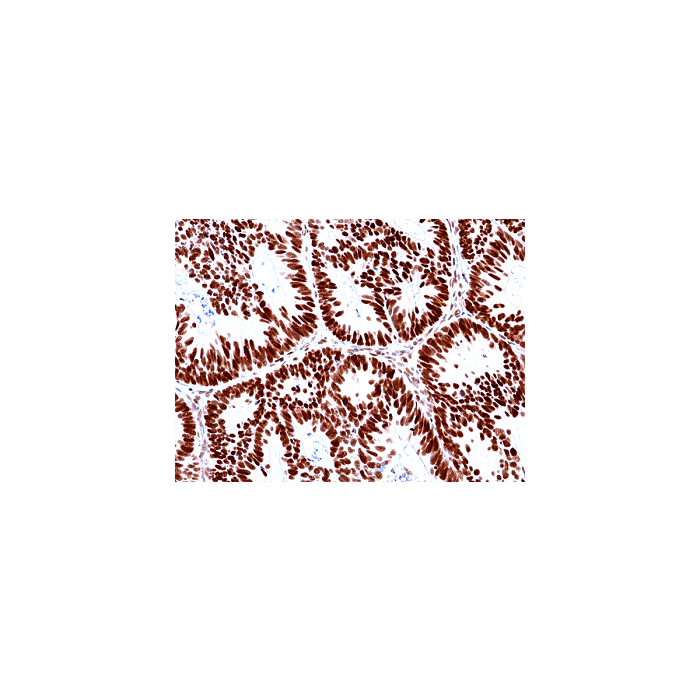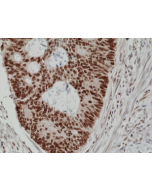Cookie Policy: This site uses cookies to improve your experience. You can find out more about our use of cookies in our Privacy Policy. By continuing to browse this site you agree to our use of cookies.
RevMab
anti-MSH2 (C-Term) (human), Rabbit Monoclonal (RM478)

| Product Details | |
|---|---|
| Synonyms | DNA Mismatch Repair Protein Msh2; MutS Protein Homolog 2 |
| Product Type | Recombinant Antibody |
| Properties | |
| Clone | RM478 |
| Isotype | Rabbit IgG |
| Source/Host | Rabbit |
| Immunogen/Antigen | Recombinant protein within 500 amino acids of the C-terminus of human MSH2. |
| Application |
Immunohistochemistry (IHC): 1:100-1:200 dilution |
| Crossreactivity | Human |
| Specificity |
This antibody reacts to human DNA mismatch repair protein MSH2. |
| Purity | Protein A purified. |
| Purity Detail | Protein A affinity purified from an animal origin-free culture supernatant. |
| Concentration | N/A |
| Formulation | Liquid. 50% Glycerol/PBS with 1% BSA and 0.09% sodium azide. |
| Isotype Negative Control | |
| Other Product Data |
Click here for Original Manufacturer Product Datasheet |
| Accession Number | P43246 |
| Declaration | Manufactured by RevMab Biosciences. |
| Shipping and Handling | |
| Shipping | BLUE ICE |
| Long Term Storage | -20°C |
| Handling Advice | Avoid freeze/thaw cycles. |
| Use/Stability | Stable for at least 1 year after receipt when stored at -20°C. |
| Documents | |
| Product Specification Sheet | |
| Datasheet |
 Download PDF Download PDF |
The mismatch repair (MMR) proteins are required to maintain genomic integrity in prokaryotes and eukaryotes, by correcting single mismatches and short unpaired regions, such as small insertions and deletions. In eukaryotes, three proteins are involved in mismatch recognition, MSH2, MSH3 and MSH6. The three proteins form two heterodimers MutSalpha (MSH2-MSH6) and MutSbeta (MSH2-MSH3). MutSalpha is thought to be involved primarily in the recognition and repair of base-base mismatches and small insertion/deletion loops. MutSbeta acts preferentially on insertion/deletion loops up to 12 nucleotides in length. The MSH2, MSH3, and PMS2 mismatch repair proteins are also involved in other DNA repair pathways such as single-strand annealing and homologous recombination, anti-recombination, DNA damage signaling, apoptosis, as well as site-specific mutagenesis during immunoglobin somatic hypermutation and class switch recombination. They interact with several other oncogenic targets, including ATR, BRCA1 or p53. Deficiencies in expression of DNA repair genes underlie many forms of cancer. If DNA repair is deficient, DNA damage tends to accumulate. Such excess DNA damage may increase mutations due to error-prone translesion synthesis and error prone repair. Elevated DNA damage may also increase epigenetic alterations due to errors during DNA repair. Such mutations and epigenetic alterations may give rise to cancer. MSH2 mutation is a commonly associated with hereditary nonpolyposis colorectal cancer (HNPCC). MSH2 mutations have also been linked to endometrial cancer and the development of endometrial carcinomas.






